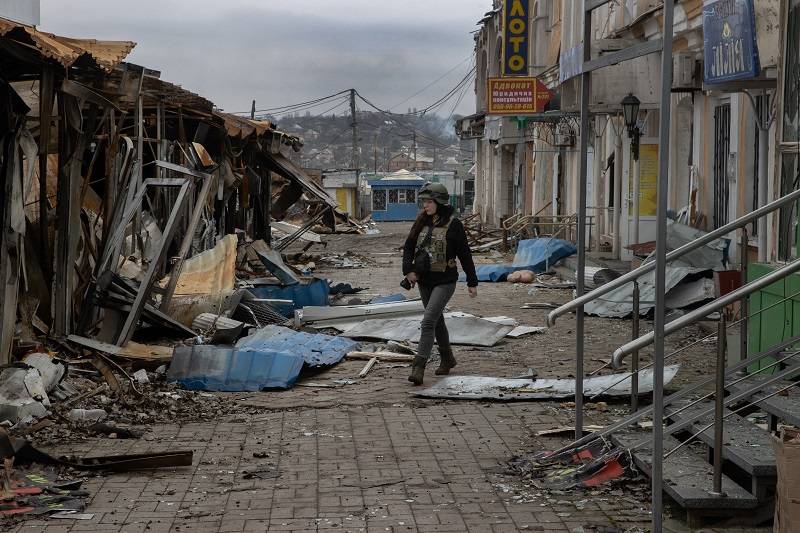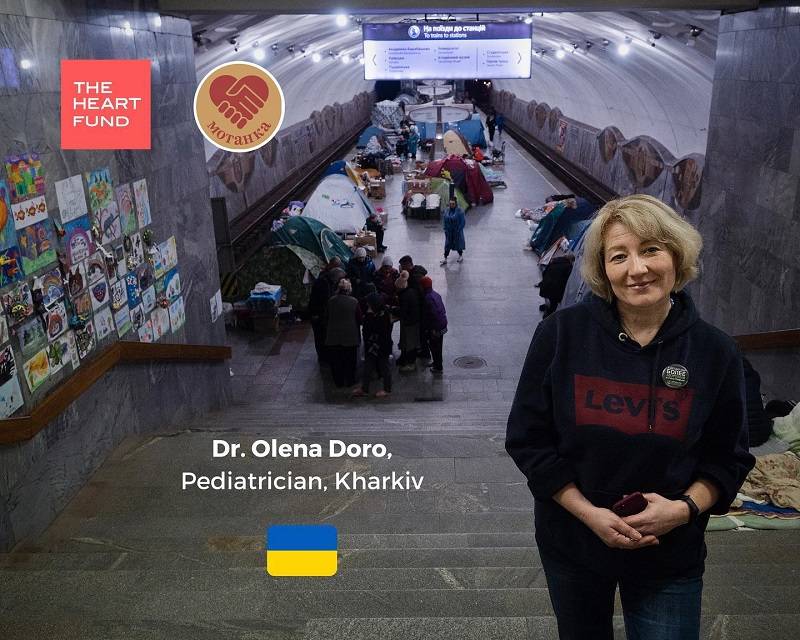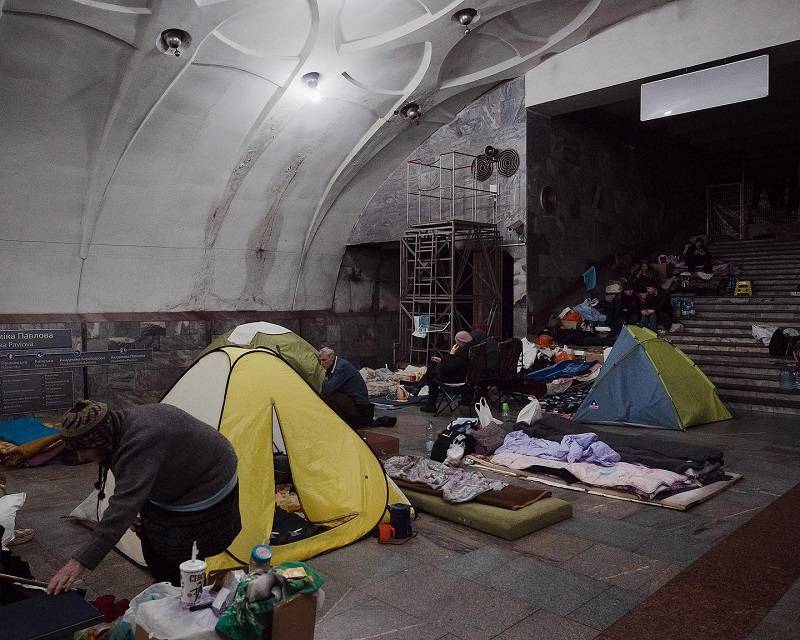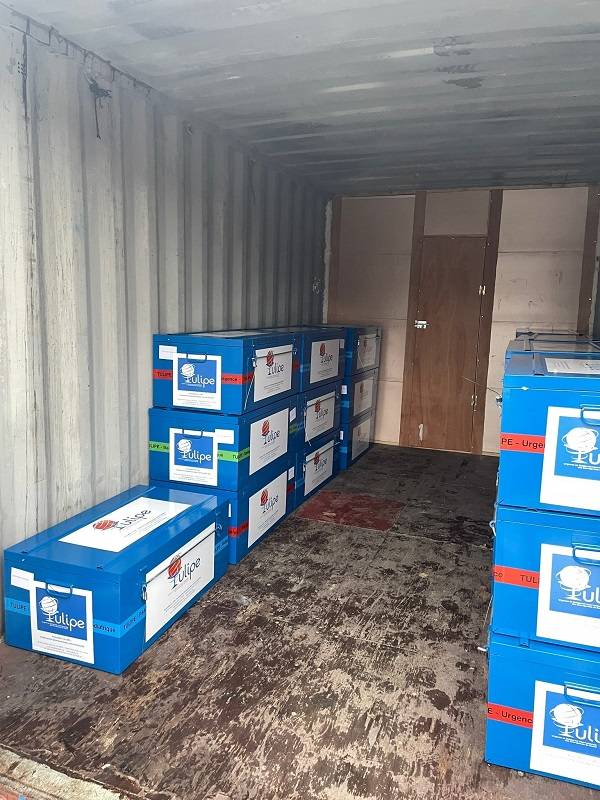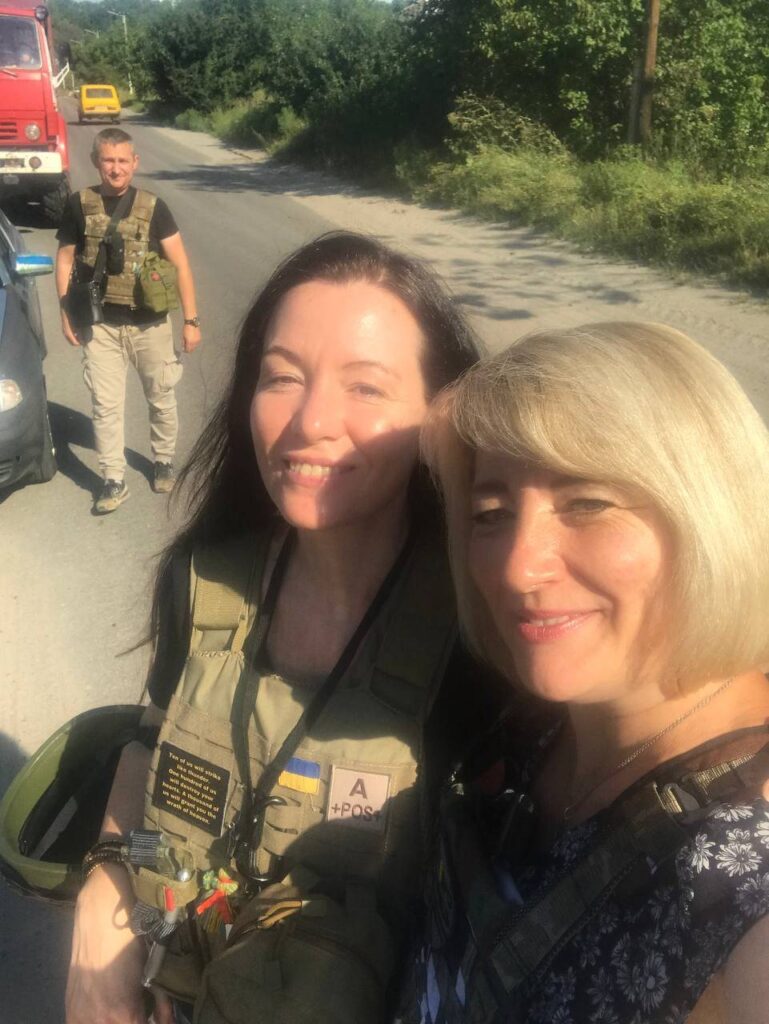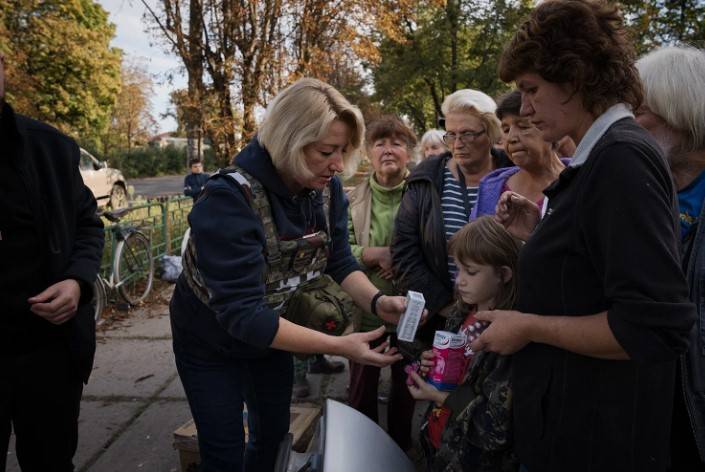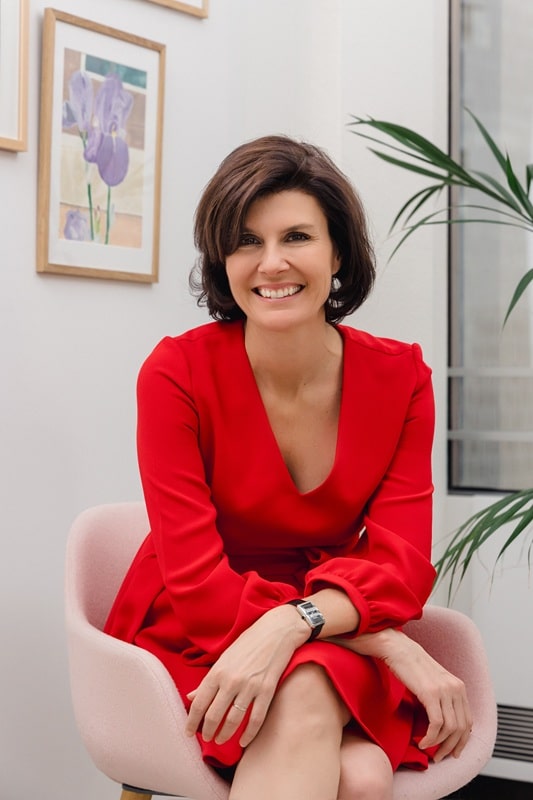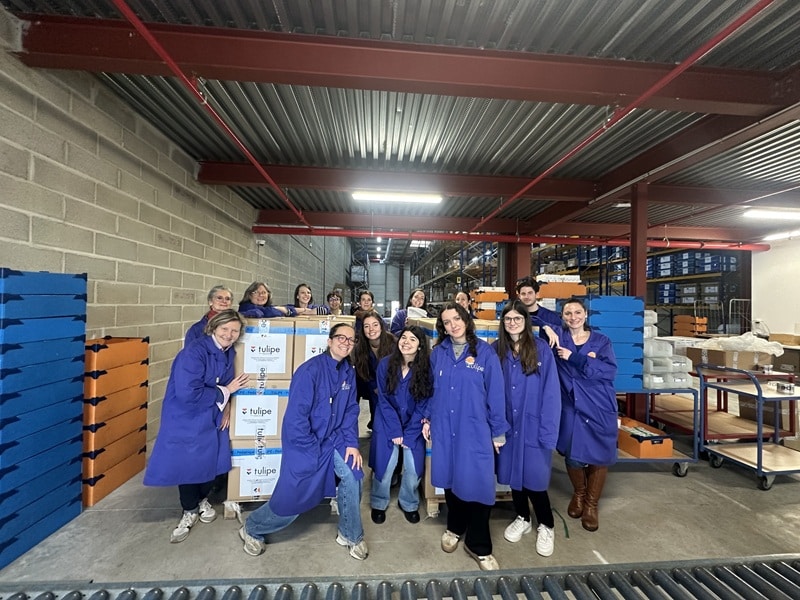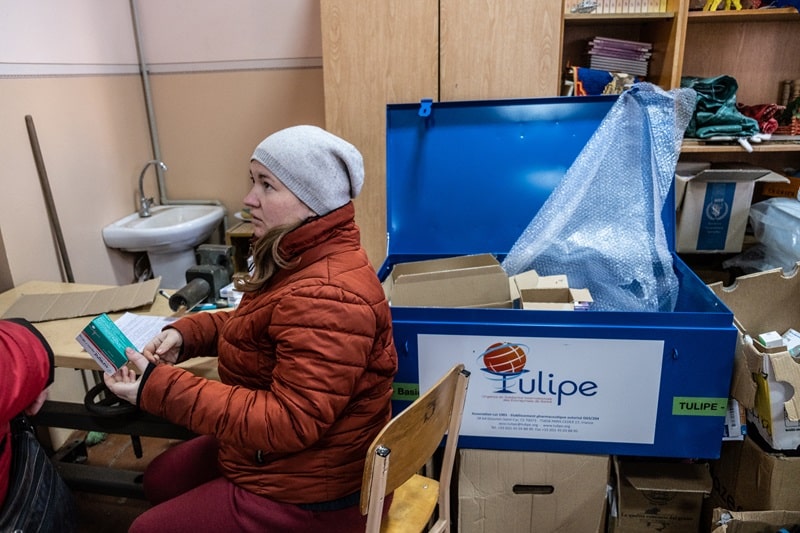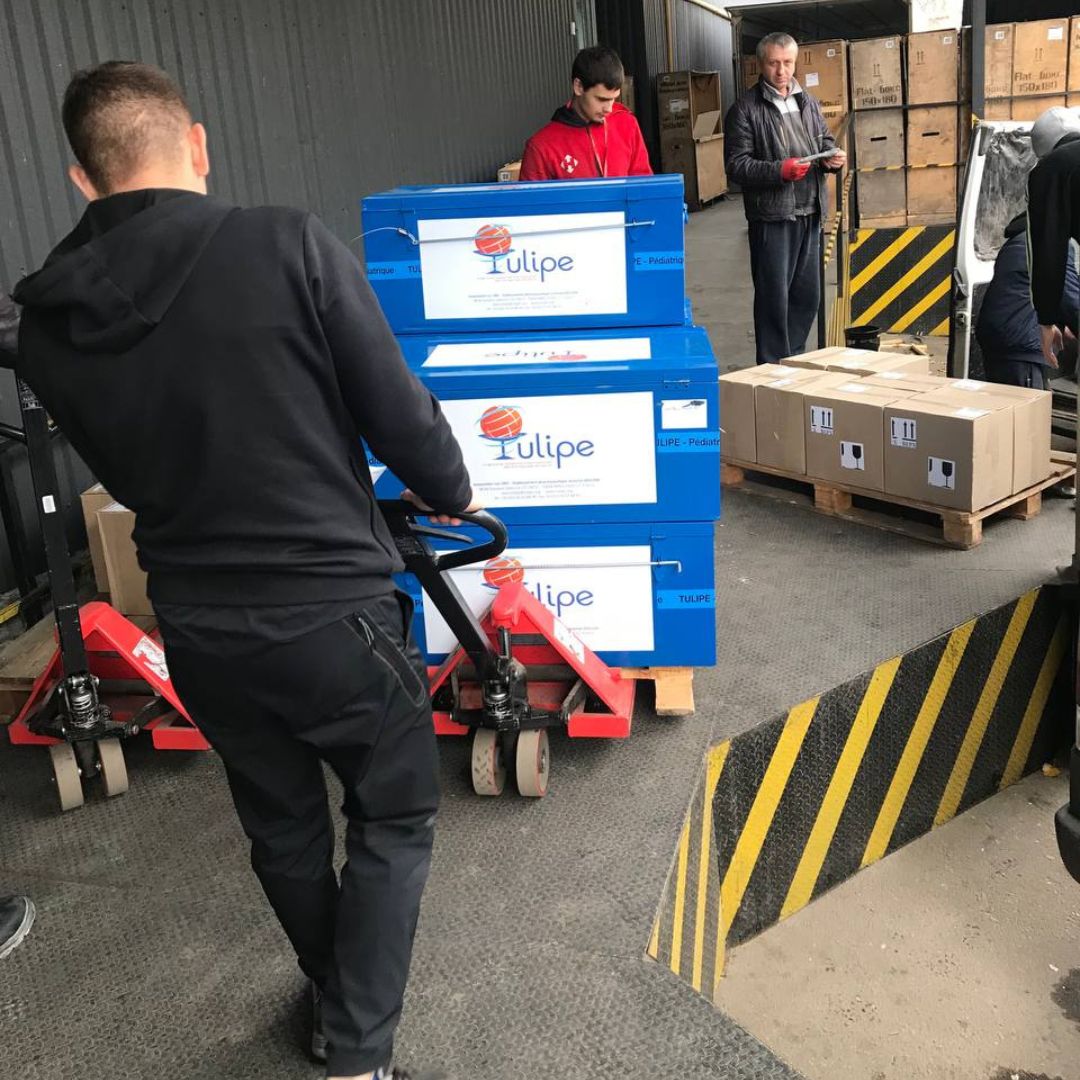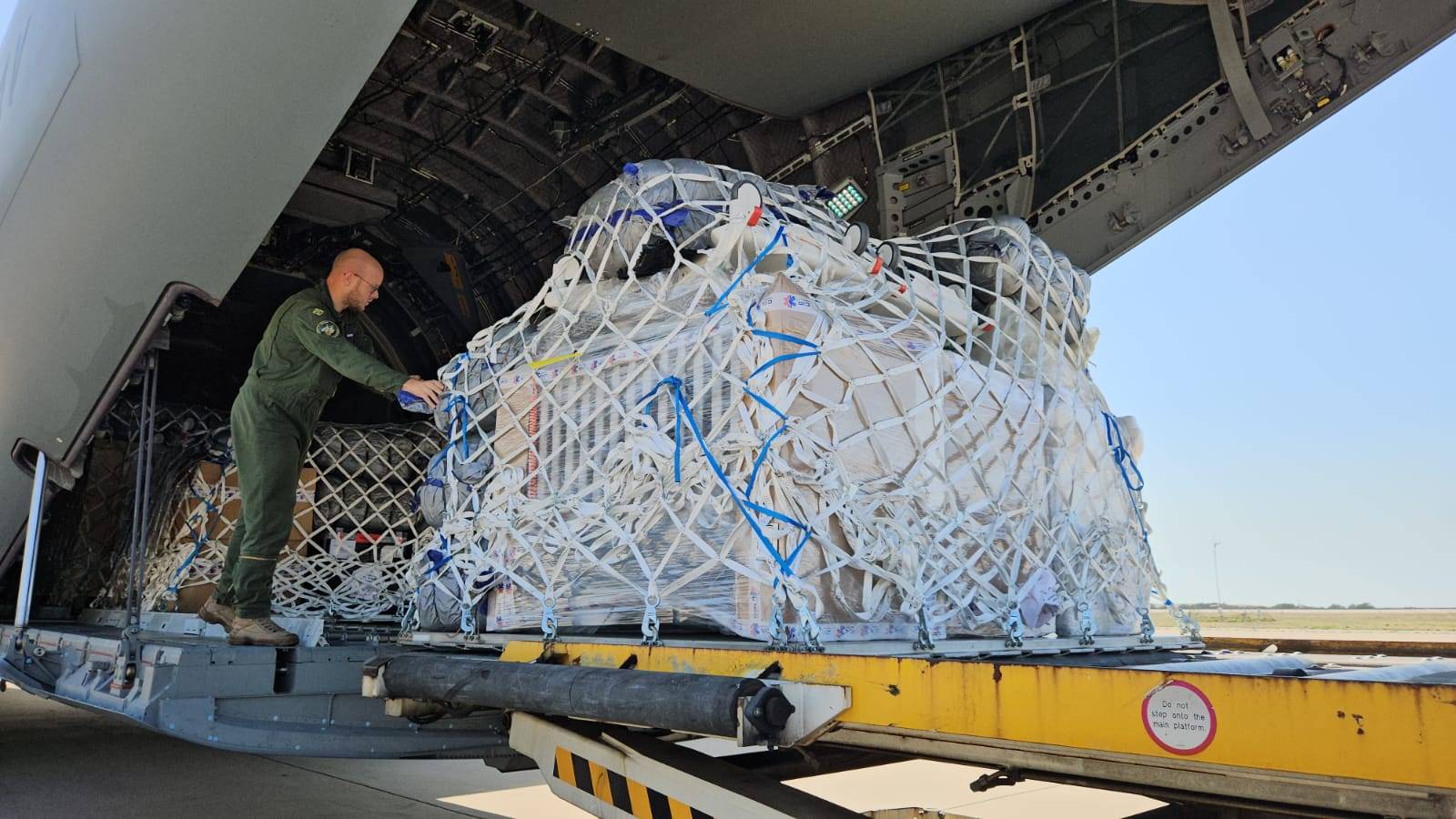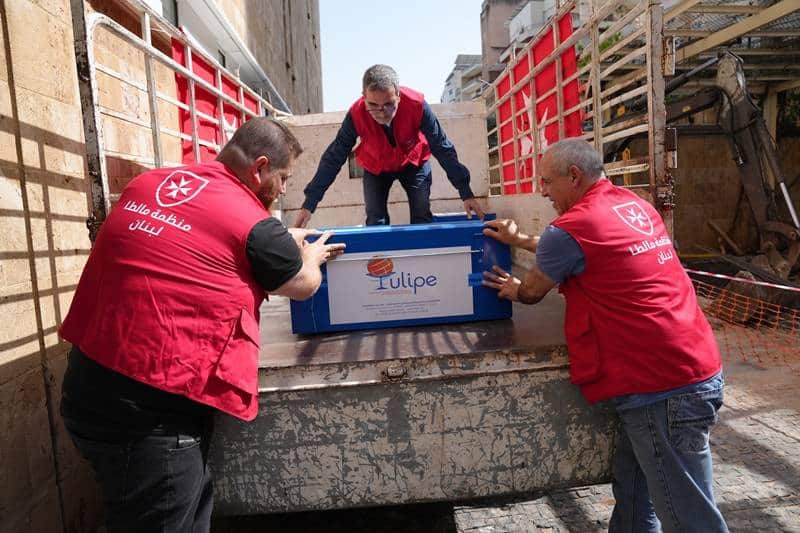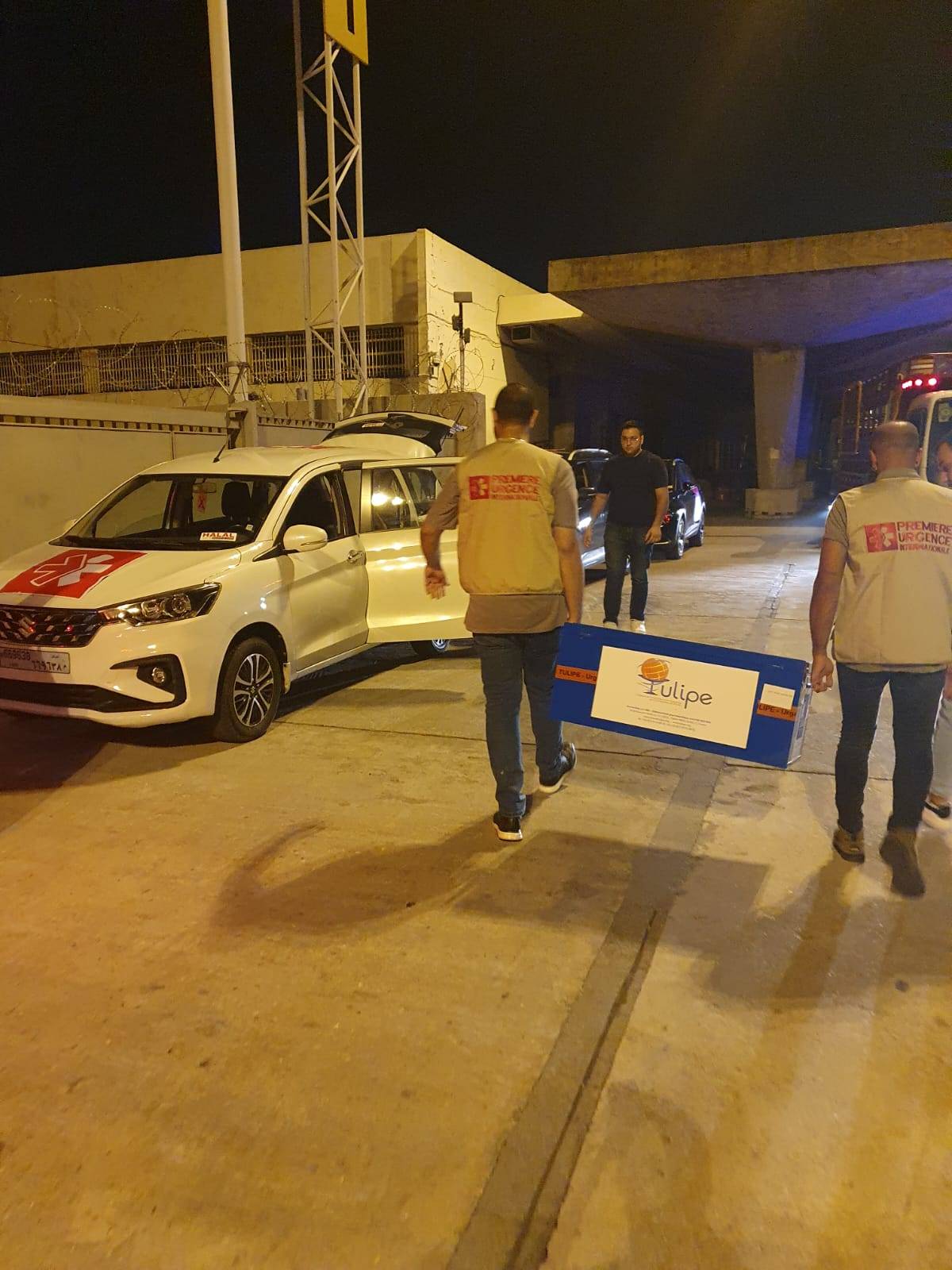Gaëlle Girbes first travelled to Ukraine in 2017 as a freelance photojournalist. She then set up her NGO, Motanka, in 2019, to help and support the victims of a war that began long before the Russian invasion on 24 February 2022. This invasion changed things for Gaëlle Girbes. She now devotes herself almost exclusively with Motanka to providing medical aid to Ukrainians, using Tulipe health product kits in particular. We interviewed her at the beginning of February.
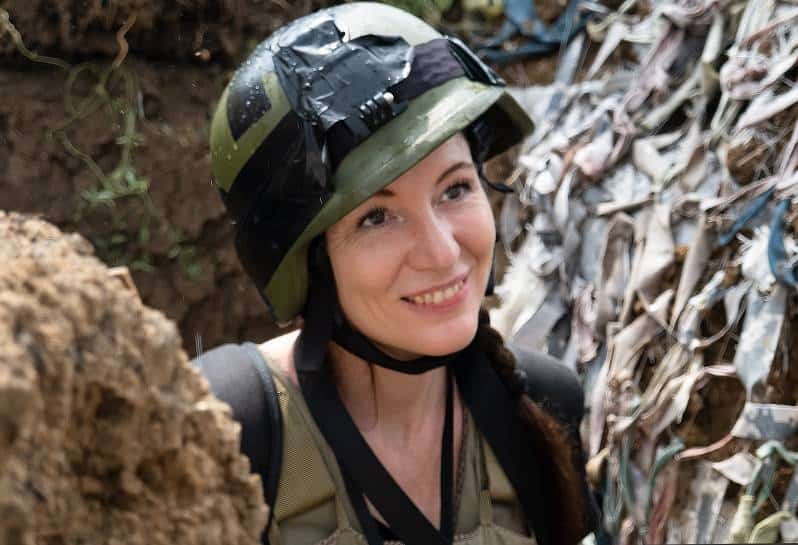
Gaëlle Girbes, photojournalist and founder of the NGO Motanka in Ukraine (©Jeremy Bigwood)
“A photojournalist is first and foremost a reporter who writes in pictures”. French freelance photojournalist Gaëlle Girbes, who has been working in Ukraine since 2017, has gone from writing through images to providing emergency medical aid to those who were the subjects of those images: the Ukrainians. The photographer who has worked for Getty Image and Stern magazine, and whose photographs have been published in media around the world, chose to give priority to humanitarian work after the start of the Russian invasion: “My mission for the NGO Motanka came first. It’s more important to meet the needs of the Ukrainian people than to take their pictures. There are a lot of journalists in Ukraine these days, but when it comes to humanitarian aid, although there is a great deal of commitment on the part of NGOs, unfortunately not all of them are able to get to the heart of the drama and take action”, explains the woman who set up her NGO in 2019. The name was chosen in reference to the Motanka doll, the Ukrainian symbol of home protection. Motanka is represented in France by an association under the law of 1901, coupled with the Ukrainian Motanka charity fund.
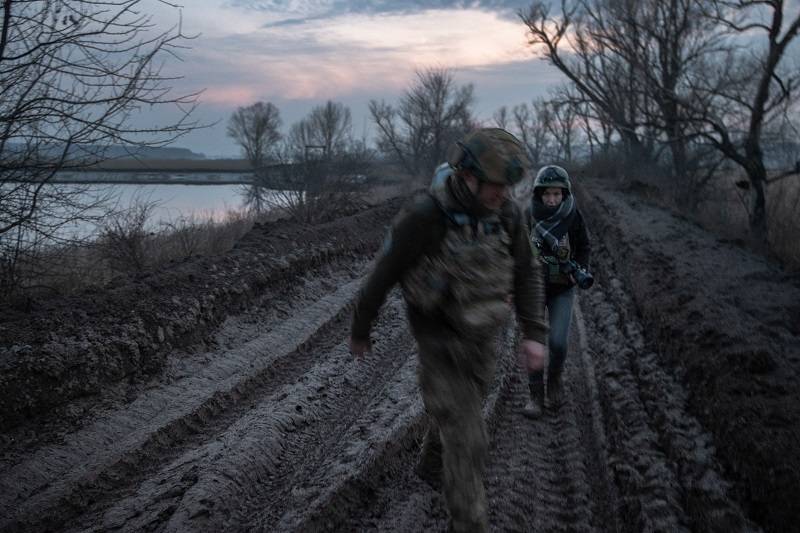
Gaëlle Girbes reporting from the field in France, her photographs having been published in L’Obs (©Tyler Hicks)
A daily war
It all began for Gaëlle in February 2017, when she discovered Ukraine during a photo assignment: “The situation in the Donbass in 2017 was neither calm nor frozen, as many people claimed, in fact it was very intense… I knew nothing about Ukraine and very little about Eastern Europe. The conflict there was very special, because it had been going on for a very long time, and was not like an internal conflict, nor like what we have seen with the terrorism of Daesh”, recalls Gaëlle Girbes, who fell in love with this welcoming and courageous people who had sometimes been wrongly described as brutal.
She began by covering the war in the Donbass region of eastern Ukraine. This conflict pits the Ukrainian government against pro-Russian separatists and Russia. “At that time, the situation was different from today. There was no fighting, no urban bombing. These were villages crossed by military positions: trenches were in place with exchanges of artillery fire between the Ukrainian and Russian or pro-Russian positions, sniper fire… All this in the midst of civilian villagers”, explains Gaëlle, moved by the dramatic living conditions of the civilians trapped in the area.
Ukrainian civilians were already suffering from the fighting long before the Russian invasion on 24 February 2022 (©Tyler Hicks)
The creation of an NGO to improve the living conditions of Ukrainians
Improving the living conditions of these civilians became Motanka’s raison d’être when it was set up in 2019: “The worst thing for them was no longer being shot at, but seeing the place where they lived become their enemy. Their homes were starting to collapse, poisoning them and making them ill, all because of the damp and unhealthy conditions. The aim of our NGO at the time was to improve their conditions by helping them to repair what could be repaired, and to give them a decent home again, by donating furniture. All this so that they could be in better health”.
Everything changed on 24 February 2022: when the Russian invasion began, the NGO’s warehouse in Kharkiv was completely destroyed. 20 tonnes of new furniture intended to restore families’ homes and equip youth centres burnt to the ground.
The changeover on 24 February 2022
“I realised at that moment that repairing houses and equipping them unfortunately no longer made any sense”, explains Gaëlle, who was in Marioupol for a report. Surprised by the bombardments, she saw the population flee as quickly as possible and, while helping an injured colleague to escape, realised the violence of the Russian soldiers. “Having worked for 6 years in Ukraine, I knew from experience that they would make no distinction between a journalist, a humanitarian, a civilian or a soldier: they are capable of killing everyone without distinction. After a year of conflict, I’m still wondering who the Russians haven’t targeted: they’ve tortured and executed journalists, killed aid workers, destroyed more than 2,800 schools, and are targeting maternity wards and hospitals. All the villages where we were working had been destroyed or were under occupation. Rebuilding under bombardment was no longer possible. Lorries loaded with tonnes of clothes and food were already arriving. That’s when I realised that the real need was for medical care, particularly in Kharkiv, under the bombs”.
Oléna Doro, a paediatrician in Kharkiv (Photo DR)
The decisive meeting with paediatrician Oléna Doro
At the end of March 2022, Gaëlle had a decisive encounter in Kharkiv as the city was being shelled. She met Oléna Doro, who was working as a doctor in an underground station. She treated people suffering from Covid and the wounded. Oléna, who was a paediatrician, lived nearby and, in view of the danger, like many other residents, went to seek shelter here. Oléna tells the story of her daily life and that of her patients, between the unhealthy conditions of living underground for so long and the stress caused by the bombardments, which led to numerous illnesses: respiratory diseases for children, cardiovascular diseases for the elderly, untreated diabetes, etc . “Oléna was completely overwhelmed and ran out of medicines. She tried to buy some with her income, but without a salary, it soon became impossible.
Unhealthy living conditions and long periods in the metro (here in Kiev) are vectors of multiple illnesses for the population (Photo DR)
Injured in Kharkiv
With Motenka, Gaëlle began to raise funds to buy medicines. As time went by, she organised herself, modifying her association’s articles of association to deal with the medical emergency, drawing up precise lists of health equipment and calling on Virginie Gallardo from the NGO The Heart Fund, who acted as a bridge with theTulipe association. The two women have known each other for several years and have already worked together on other issues. “Our NGOs decided to work together to respond to this emergency. It’s an emergency that the major international NGOs can’t necessarily respond to. These NGOs have security standards and do not have the same ease of access as small local structures in militarised areas. You are more discreet, you don’t travel in a humanitarian convoy with flags and logos. We pass among civilians and are more difficult for the Russians to target”, explains Gaëlle, who was injured in Kharkiv at the end of March 2022, when she was travelling in a vehicle bearing the logo of a local NGO supported by the UN.
Delivery of Tulipe health kits to the NGO Motanka in Ukraine (January 2023 -DR)
“The Tulipe kits have been a blessing”.
Motanka’s founder’s objective after this meeting with Oléna Doro is to raise funds to buy medicines. “We go through The Heart Fund for Tulipe. I send the lists I receive from the doctors and Virginie Gallardo takes care of the requests. I realised when I went through the composition of the Tulipe kits that they were well made and met a wide range of requests that we had in the field. It’s a blessing, because these kits also represent a huge volume that we would never be able to achieve with a traditional collection. This has enabled us to meet some very significant medical needs. With one Tulipe kit, we can take care of 500 people; with several kits, that’s several thousand people”.
Drug distribution points close to the population
The Tulipe kits are then sent to the doctors on site. At the same time, drug distribution points are being sought in the most dangerous or neglected areas of the country. This is particularly the case in certain small villages, where only those who were unable to flee – the elderly or disabled – remain. It was in one of these places, for example, that Gaëlle identified a possible health centre: “In one of these small villages, there was still a woman dentist. She used to distribute food rations there on a voluntary basis. She immediately identified a medical emergency: patients who hadn’t been able to receive their treatment for months. We agreed with Motanka that, as a health professional intending to stay on site, she could receive medicines, read prescriptions and administer treatment to the population. With our support, she became the village doctor by substitution”.
Distributing medicines in a bombed-out area
Motanka also provides assistance to hospitals, and before the Ukrainian counter-offensive on Kharkiv this autumn, which enabled the Russians to regain ground, numerous missions to deliver medicines were carried out in villages located in the grey zones, i.e. between the Russian and Ukrainian positions. “These are almost inaccessible places, hot spots like Bakhmout. Olena was there a fortnight ago. The aim of her mission was to reach the centre of Bakhmout and reach 250 children sheltered underground. She was unable to reach them because of the danger. The day before, we learnt that a foreign medical volunteer had been killed in a bombardment while trying to evacuate people. The Russians, on the counter-offensive, are moving on Bakhmut, which is surrounded, and their next objective is Kramatorsk, which they have started shelling. Last week (early February), they used hypersonic missiles and 610 flats were destroyed, as well as a maternity hospital and a hospital. They were targeting the town centre and residential areas”.
Oléna Doro and Gaëlle Girbes on a mission for the NGO Motanka (Photo DR)
The recognition of the Ukrainians, a strength to hold on and continue
On 21 February, the NGO Human Rights Watch accused the Russian army of “war crimes” in the missile attack on the Kramatorsk railway station in eastern Ukraine. ” We sometimes had to hide in cellars or backyards to distribute medicines, as in Mariinka and Kurakhove, because we were being shot at”, adds Gaëlle. For her, more than a job, more than a mission, it’s a true vocation. “I’ve had no private life, I haven’t been able to play sport for a year and I barely have time to sleep. The time I do have is entirely devoted to preparing giant to-do lists and trying to complete them on time. Doing what you believe in, giving to others, is also giving to yourself. It feels really good to be useful. The hardest part is the feeling of failure, like when we couldn’t reach those children sheltering in the basement. It’s all the more difficult because you’ve given everything. But when you succeed, when you see the look on the face of someone who has understood that their health is going to improve thanks to your action, it gives you strength, enormous strength. That’s what keeps you going, keeps you going.
Distribution of medicines donated by Tulipe on 20 September 2022 by the Ukrainian organisation Dobrochynec and Dr Oléna Doro (©Gaëlle Girbes)
Tulipe kits for emergency situations
At the end of January 2023, Motanka received 24 kits from theTulipe association, including kits for adults, paediatric kits and emergency kits. “Thanks to these kits, we can operate until the end of March. They are highly adaptable and respond to emergency situations. A situation that we are currently experiencing in Bakhmout. Some of these kits will also be used in Kramatorsk, in the civilian hospital that receives all the patients from these hot spots: people injured by bullets or as a result of bombardments. The paediatric and adult kits are used in areas where doctors working with us can interact directly with the population throughout north-eastern Donbass and other areas where fighting is taking place and where villages have been devastated”, explains Gaëlle, who is responsible for delivering the kits to doctors in these areas and identifying new medical needs.
Constant need for health products
“We’re constantly on the lookout for other mobile doctors working in the same way as Oléna. Certain needs remain constant, for adults: treatment for diabetes, arterial problems, blood pressure and stress-related pathologies. For children, the current need is for treatment for respiratory problems. Many of them live in unheated premises, when temperatures are well below zero, and this will continue until April. In some hospitals, operations are carried out on kitchen tables because there is nothing left. The situation today is catastrophic and is set to continue. Putin will not sign a peace agreement or accept defeat. That has never been part of his mentality. I’ve been studying him for years. He will go all the way, even if it means losing his life, which means that many Ukrainians will lose theirs. It’s a humanitarian disaster that Europe won’t fully grasp until after the event,” concludes Gaëlle Girbes.
To find out more and support Motanka: motanka.fr
The Tulipe association: a year of mobilisation for UkraineSince the beginning of the Russian invasion of Ukraine, the Tulipe association, with the support of its member companies and donors, has donated nearly 165 tonnes of health products to ten NGOs and to the Crisis and Support Centre of the Ministry of Europe and Foreign Affairs. The NGOs receiving donations include Première Urgence Internationale, Action Contre la Faim, la Chaîne de l’Espoir, GSCF Groupement de Secours et Catastrophe Français, the World Rescue Corps, AMCFU – Action Médicale et Caritative France-Ukraine and the Heart Fund. Two major operations carried out thanks to the CGM-CMA Foundation and the Crisis Centre, in March and September, were also supported. A new donation of 1.5 tonnes of health products is currently on its way to Ukraine. |
